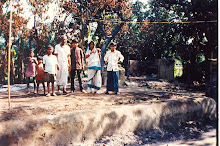Memoirs
of Homeland:
Refugees
of 1947 Bengal Partition in India
By
Dr. Sachi Ghosh Dastidar & Dr. Shefali Sengupta Dastidar
Kolkata,
India, Book Release, February 20, 2016
Shefali
S. Dastidar
On February
20, 2016 the Indian Subcontinent Partition Documentation Project Inc. (ISPaD) New
York organized a book release and book reading at the former home, now a
museum, of the famous 19th -20th Century Bengali novelist Sarat Chandra
Chatterjee's at Ballyganj, south Kolkata (Calcutta.) "Memoirs of Homeland:
Refugees of 1947 Bengal Partition in India", authored by Dr. Sachi
G. Dastidar and this writer is published by Firma KLM of Kolkata. It is a 320-page
softcover book. This book was released before the February 2016 Kolkata Book
Fair. Proceeds from the sale of the book in the U.S. goes to the Partition Documentation
Project of New York.
Book Availability & Price: $10 at Partition Center Office in NY (ispad1947@gmail.com or 917-524-0035; or at FIRMA KLM office, Kolkata; firmaklm@yahoo.com or (33) 2221-7294)
At the Podium, from left, Mrs. Ruchira Chakrabarty, Mrs.
Pratima RoyChoudhury, Mr. Tapan Das and Mr. Swarup Mitra
Here is a
bit of explanation from the book, "Between 1982 and 1986...we decided to
interview (in the U.S.) some of the refugees- Hindu and Muslim - as many of
their stories were riveting to us, and now socializing with individuals from
the "other" groups from whom they fled earlier....How do they feel
about their homeland? Not so surprisingly, all the refugees remembers in minute
detail how and when their families fled, or what made them to choose a
different nationality leaving their home of their ancestors, especially for
Hindus for whom the village water and soil, flower and fish, are sacred and
needed for religious services. Majority of refugees were Hindus who fled from
East Pakistan/East Bengal to India......Altogether there are 22 stories; 16 men
and 6 women; Hindu 18 and Muslim 4." (p 14)
Rohit Shome introducing the book
Guests
started gathering for the book release in that Saturday morning. There were
over thirty attendees of very mixed group, mostly from academia and
professionals. Mr Rohit Shome, a young college graduate welcomes the guests and
acted as the MC. He introduced this writer to speak about the Indian
Subcontinent Partition Documentation Project Inc. (ISPaD) organization (New
York, USA), activities which include monthly events in New York, yearly
conference, a journal publication, publishing a newsletter, archiving
partition-related materials, saving oral records of refugees, protectors and
survivors of Indian partition, providing expert witness, and more.
Mrs. Ruchira (IraDi) Speaking
Rohit
introduced the guests. He welcomed the Chief Guest Mrs. Ruchira Chakravarty, a
poet and older daughter of the late poet Bishnu De and wife of Dr. Satyesh Chandra
Chakravarty who was Dr. Dastidar's professor and mentor while I was studying at
Presidency College, Kolkata. Dr. and Mrs. Chakravarty are now family friends
for decades. Mrs. Chakravarty was a teacher of the South Point School for many
dedades. Mrs. Chakaravarty known as IraDi, Older Sister Ira, was invited to
open the book. IraDi opened the book with great cheer and enthusiasm from the
audience. Then I presented a signed copy of the book to IraDi.
Introduction of the Book
Rohit then introduced
Mr. Tapan Das, a retired planner for the West Bengal Government, Mr. Das worked
with my coauthor Dr. Sachi Dastidar at Calcutta Metropolitan Planning Organization
(CMPO) in the 1970s. This book has been dedicated to Mr. Tapan Das. We believe
that without dedicated assistance from Das it would have been impossible for
Dastidars to publish this book, and they are truly grateful to him. Das talked
about his good time, frustration, and communication with Mr. Swarup Mitra, a
top administrator of the Firma KLM. On behalf of the authors a signed copy of
the book with a token gift and a "Thank You" card was presented to Mr.
Das.
Mr. Tapan Das speaking
Rohit introduced
Mr. Swarup Mitra from Firma KLM Publishers. Mr. Mitra talked about the authors,
and other books of these authors published by them. He talked on behalf of Mrs.
Swati Mukherjee, the owner of the publishing company who could not attend since
she was out of town. Mitra said that they are very happy to publish Dastidar books.
Mitra was presented a token gift and a "Thank you" card from
Dastidars.
Mr. Swarup Mitra of Firma KLM speaking
A number of
individuals spoke afterwards. Dr. R. N. Chattopadhay of Indian Institute of
Technology at Kharagpur, and founder of Prembazar Institute, an organization of
past and present faculty and staff of IIT-Kharagpur that helps education at
number of schools in nearby villages. Following Chatterjee Mrs. Pratima RoyChoudhury,
a Special Guest, spoke and reminisced about her memoirs back home in
LakshmanKathi village East Bengal, now Bangladesh.
Speakers during Q&A
Then I read
a bit from the last story in the book of Mrs. Ghosh, her plight as a refugee.
Growing up in Madaripur, now Bangladesh, married at LakshmanKathi village, then
moving to Dhaka for schooling, and then finally to Kolkata, India as a
refugee.
Speakers during Q&A
Rohit
requested all attendees to introduce themselves, and then open the forum for
question and answer. Most of the attendees expressed their experiences in their
own words, some experience of close relatives.
In typical
Indian-American style the event was closed with a vote of thanks followed by
networking with tea and snacks.
Speakers during Q&A
Speakers during Q&A
Speakers during Q&A
A Section of Audience
Post-release Networking
Post-release Aaddaa (Chat Session)





























